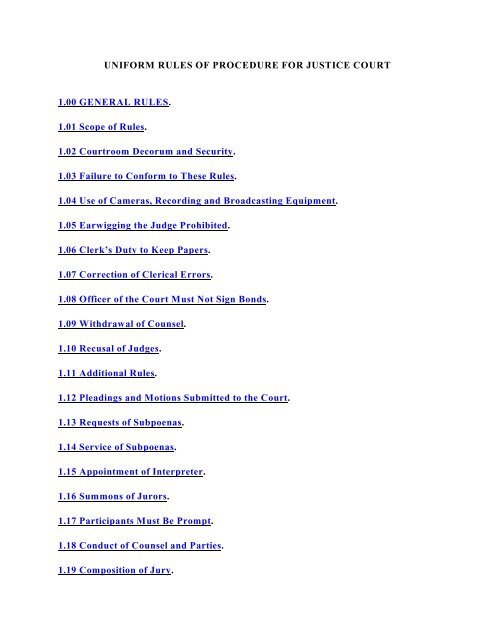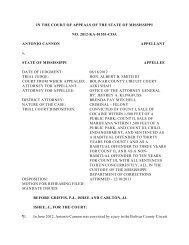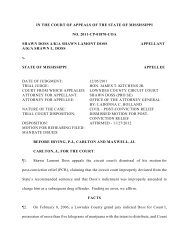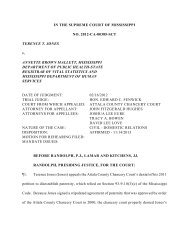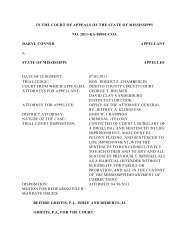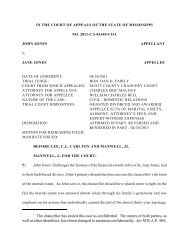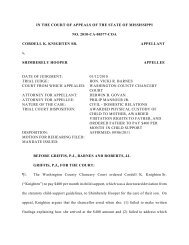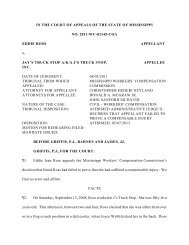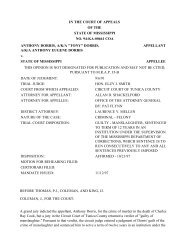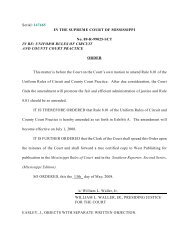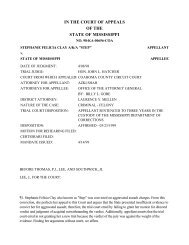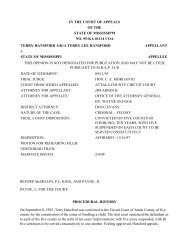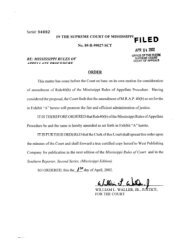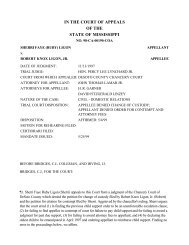Uniform Rules of Procedure for Justice Court - Mississippi Supreme ...
Uniform Rules of Procedure for Justice Court - Mississippi Supreme ...
Uniform Rules of Procedure for Justice Court - Mississippi Supreme ...
You also want an ePaper? Increase the reach of your titles
YUMPU automatically turns print PDFs into web optimized ePapers that Google loves.
UNIFORM RULES OF PROCEDURE FOR JUSTICE COURT<br />
1.00 GENERAL RULES. <br />
1.01 Scope <strong>of</strong> <strong>Rules</strong>. <br />
1.02 <strong>Court</strong>room Decorum and Security. <br />
1.03 Failure to Con<strong>for</strong>m to These <strong>Rules</strong>. <br />
1.04 Use <strong>of</strong> Cameras, Recording and Broadcasting Equipment. <br />
1.05 Earwigging the Judge Prohibited. <br />
1.06 Clerk’s Duty to Keep Papers. <br />
1.07 Correction <strong>of</strong> Clerical Errors. <br />
1.08 Officer <strong>of</strong> the <strong>Court</strong> Must Not Sign Bonds. <br />
1.09 Withdrawal <strong>of</strong> Counsel. <br />
1.10 Recusal <strong>of</strong> Judges. <br />
1.11 Additional <strong>Rules</strong>. <br />
1.12 Pleadings and Motions Submitted to the <strong>Court</strong>. <br />
1.13 Requests <strong>of</strong> Subpoenas. <br />
1.14 Service <strong>of</strong> Subpoenas. <br />
1.15 Appointment <strong>of</strong> Interpreter. <br />
1.16 Summons <strong>of</strong> Jurors.<br />
1.17 Participants Must Be Prompt. <br />
1.18 Conduct <strong>of</strong> Counsel and Parties. <br />
1.19 Composition <strong>of</strong> Jury.
1.20 Voir Dire <strong>of</strong> Jurors. <br />
1.21 Alternate Jurors. <br />
1.22 Communications With Jurors. <br />
1.23 Jury Instructions. <br />
1.24 Jury Deliberations. <br />
1.25 Appeals From <strong>Justice</strong> <strong>Court</strong>. <br />
2.00 CIVIL RULES <br />
2.01 Applicability <strong>of</strong> <strong>Rules</strong>. <br />
2.02 Form <strong>of</strong> Action. <br />
2.03 Commencement <strong>of</strong> Civil Action. <br />
2.04 Issuance <strong>of</strong> Summons. <br />
2.05 Computation <strong>of</strong> Time. <br />
2.06 Failure to Appear on Trial Date. <br />
2.07 Counterclaims and Set<strong>of</strong>fs. <br />
2.08 Representation By Guardian Ad Litem. <br />
2.09 Substitution <strong>of</strong> Parties. <br />
2.10 Dismissal <strong>of</strong> an Action by Written Motion. <br />
2.11 Consolidation and Separation <strong>of</strong> Trials. <br />
2.12 Default Judgment. <br />
2.13 Mistrial. <br />
2
2.14 Post-judgment Actions.<br />
2.15 En<strong>for</strong>cement <strong>of</strong> Judgements.<br />
3.00 CRIMINAL RULES<br />
3.01 Applicability <strong>of</strong> <strong>Rules</strong>.<br />
3.02 Representation By Counsel.<br />
3.03 Issuance <strong>of</strong> Warrants.<br />
3.04 Bail Bonds.<br />
3.05 Multiple Offenses.<br />
3.06 Joinder.<br />
3.07 Amendments <strong>of</strong> Affidavits.<br />
3.08 Pleas.<br />
3.09 Mistrial.<br />
3.10 Sentencing.<br />
UNIFORM RULES OF PROCEDURE FOR JUSTICE COURT<br />
[Adopted Effective May 1, 1995]<br />
RULE 1.00 GENERAL RULES<br />
RULE 1.01 SCOPE OF RULES<br />
These rules govern procedures in justice court and, except where specified, apply to<br />
all actions, civil and criminal.<br />
3
RULE 1.02 COURTROOM DECORUM AND SECURITY<br />
The court shall be opened <strong>for</strong>mally and conducted with dignity and decorum at all<br />
times. The judge shall wear a judicial robe at all times when presiding in open court. Each<br />
<strong>of</strong>ficer <strong>of</strong> the court shall be responsible <strong>for</strong> promotion <strong>of</strong> respect <strong>for</strong> the court.<br />
No one shall wear or bear firearms or weapons <strong>of</strong> any description in the courtroom,<br />
except bailiffs and any necessary guards <strong>of</strong> a prisoner, unless authorized by the court.<br />
RULE 1.03 FAILURE TO CONFORM TO THESE RULES<br />
Any person embraced within these rules who violates the provisions here<strong>of</strong> may be<br />
subject to sanctions, contempt proceedings or other disciplinary actions imposed or initiated<br />
by the court.<br />
RULE 1.04 USE OF CAMERAS, RECORDING<br />
AND BROADCASTING EQUIPMENT<br />
The use <strong>of</strong> cameras, recording or broadcasting equipment, or such shall be governed<br />
by the Code <strong>of</strong> Judicial Conduct.<br />
RULE 1.05 EARWIGGING THE JUDGE PROHIBITED<br />
No person shall undertake to discuss with, or in the presence <strong>of</strong>, or hearing <strong>of</strong> the<br />
judge, the law or facts or alleged facts <strong>of</strong> any case then pending in the court, or likely to be<br />
instituted therein, except in the orderly progress <strong>of</strong> the trial, and arguments or briefs<br />
connected therewith; nor attempt in any manner, except as stated above, to influence the<br />
decision <strong>of</strong> the judge in any manner.<br />
RULE 1.06 CLERK’S DUTY TO KEEP PAPERS<br />
No original record, or any part <strong>of</strong> a file, record or court papers shall be taken from the<br />
clerk’s custody without the permission <strong>of</strong> the clerk <strong>of</strong> the court. The docket <strong>of</strong> the court shall<br />
at all times remain in the <strong>of</strong>fice <strong>of</strong> the justice court clerk. The clerk shall retain custody <strong>of</strong><br />
the docket, make all entries thereon, keep it safe and provide it to the court <strong>for</strong> examination<br />
in the <strong>of</strong>fice. The docket may be maintained by computer. Failure <strong>of</strong> a judge to sign the<br />
docket shall not invalidate the actions <strong>of</strong> the court contained therein.<br />
RULE 1.07 CORRECTION OF CLERICAL ERRORS<br />
4
Clerical mistakes in judgments, orders, or other parts <strong>of</strong> the record, and errors therein<br />
arising from oversight <strong>of</strong> omission, may be corrected by the court at any time on its own<br />
initiative or on motion <strong>of</strong> any party and, after such notice, if any, as the court orders, up until<br />
the time the record is transmitted by the clerk <strong>of</strong> the justice court to the higher court. Notices<br />
<strong>of</strong> clerical errors corrected shall be given to the parties <strong>of</strong> the action.<br />
RULE 1.08 OFFICER OF THE COURT MUST NOT SIGN BONDS<br />
No <strong>of</strong>ficer <strong>of</strong> the court shall sign any bond <strong>of</strong> any kind in or to any court <strong>of</strong> this state.<br />
RULE 1.09 WITHDRAWAL OF COUNSEL<br />
When an attorney makes an appearance <strong>for</strong> a party in a case, that attorney will not be<br />
allowed to withdraw as attorney <strong>for</strong> the party without the permission <strong>of</strong> the court. The<br />
attorney making the request shall give notice to his client and to all attorneys in the cause and<br />
certify the same to the court in writing. The court shall not permit withdrawal without prior<br />
notice to his client and all attorneys <strong>of</strong> record.<br />
RULE 1.10 RECUSAL OF JUDGES<br />
If a justice court judge recuses himself or is otherwise unable to serve in a case, the<br />
case shall be rotated to another justice court judge <strong>of</strong> the county. If no justice court judge is<br />
able to serve because <strong>of</strong> recusals, or is otherwise unable to serve, then a circuit court judge<br />
<strong>of</strong> the district, in consultation with the recused judge(s), may appoint any justice court judge<br />
from a surrounding county to hear the case.<br />
RULE 1.11 ADDITIONAL RULES<br />
No rule <strong>of</strong> procedure, local or otherwise, shall be adopted without the approval <strong>of</strong> the<br />
<strong>Mississippi</strong> <strong>Supreme</strong> <strong>Court</strong>.<br />
RULE 1.12 PLEADINGS AND MOTIONS<br />
SUBMITTED TO THE COURT<br />
All pleadings, motions or any other application to the court shall bear the name,<br />
address and phone number <strong>of</strong> the party filing the same, and, if any attorney is representing<br />
the party, the name, <strong>of</strong>fice address and phone number <strong>of</strong> the attorney.<br />
5
RULE 1.13 REQUESTS OF SUBPOENAS<br />
Requests <strong>for</strong> subpoenas must be made in writing and delivered to the clerk in a<br />
reasonable time be<strong>for</strong>e the trial date. The written request to the clerk shall give the address<br />
<strong>of</strong> the witnesses and other in<strong>for</strong>mation, so as to furnish sure guides to the person serving the<br />
subpoena. These requests must be preserved by the clerk.<br />
RULE 1.14 SERVICE OF SUBPOENAS<br />
(a) Every subpoena shall be issued by the clerk under seal <strong>of</strong> the court, shall state the<br />
name and address <strong>of</strong> the court and the title <strong>of</strong> the action, and shall command each person to<br />
whom it is directed to attend and give testimony at a time and place therein specified.<br />
(b) A subpoena may be served by the sheriff, his deputy, a constable, or by any other<br />
person who is not a party and is not less than 18 years <strong>of</strong> age, and his return endorsed thereon<br />
shall be prima facie pro<strong>of</strong> <strong>of</strong> service, or the witness may acknowledge service in writing on<br />
the subpoena. Service <strong>of</strong> the subpoena shall be executed upon the witness personally.<br />
(c) At the request <strong>of</strong> any party, subpoenas <strong>for</strong> attendance at a hearing or trial shall be<br />
issued by the clerk <strong>of</strong> the court in which the hearing or trial is held. A subpoena requiring<br />
the attendance <strong>of</strong> a witness at a hearing or trial may be served at any place within the state.<br />
(d) Failure by any person, without adequate excuse, to obey a subpoena served upon<br />
him may be subject to the penalties provided in Miss. Code Ann. § 11-9-115.<br />
RULE 1.15 APPOINTMENT OF INTERPRETER<br />
The court may appoint an interpreter pursuant to Miss. Code Ann. § 13-1-301 through<br />
§ 13-1-315.<br />
RULE 1.16 SUMMONS OF JURORS<br />
When a jury is needed in justice court, the justice court clerk shall notify the circuit<br />
court clerk who shall issue summonses <strong>for</strong> a jury in the same manner as <strong>for</strong> circuit court. The<br />
summonses shall be returnable to justice court.<br />
RULE 1.17 PARTICIPANTS MUST BE PROMPT<br />
Every person whose presence is required <strong>for</strong> the conduct <strong>of</strong> the business <strong>of</strong> the court<br />
shall be in prompt attendance.<br />
6
RULE 1.18 CONDUCT OF COUNSEL AND PARTIES<br />
(a) Each party or its representative shall manifest an attitude <strong>of</strong> pr<strong>of</strong>essional respect<br />
toward the judge, the opposing attorney, witnesses, defendants, jurors, and others in the<br />
courtroom. In the courtroom, attorneys shall not engage in behavior or tactics purposely<br />
calculated to irritate or annoy the opposing attorney and shall address the court, not the<br />
opposing attorney, on all matters relating to the case.<br />
(b) All objections to testimony must be made to the judge and not to the opposing<br />
attorney. The objection must be specific and not general. The attorneys will not be permitted<br />
to argue between themselves. Attorneys must stand when addressing the court, examining<br />
witnesses, and addressing the jury, except when excused <strong>for</strong> good cause by the court.<br />
Attorneys may directly address the jury panel only during voir dire, opening and closing<br />
statements.<br />
(c) Attorneys and/or parties must limit themselves to asking questions and must<br />
refrain from making statements, quips, or side remarks in an examination <strong>of</strong> a witness. The<br />
examination <strong>of</strong> witnesses will be conducted fairly and objectively, with the attorneys and<br />
witnesses displaying respect and courtesy to each other. The attorneys may not ask questions<br />
merely to embarrass or humiliate the witness.<br />
(d) In opening statements, and in closing arguments, an attorney may not attack the<br />
opposing attorney. The attorneys may not call any juror by name, or have any personal<br />
contact with the jury whatsoever, nor attempts to converse with or solicit audible answers<br />
from the jurors individually. In the argument to the jury, the attorneys will be required to<br />
keep within proper bounds, and any attempt to inject improper matter may be stopped by the<br />
court without the necessity <strong>of</strong> an objection. The attorneys will refrain from thanking the jury<br />
<strong>for</strong> acting as jurors and, after return <strong>of</strong> a verdict by the jury, neither the attorneys, parties, or<br />
spectators shall <strong>of</strong>fer their congratulations, thanks, or condemnation to the jury <strong>for</strong> the verdict<br />
returned.<br />
RULE 1.19 COMPOSITION OF JURY<br />
Juries shall consist <strong>of</strong> six (6) persons and, in the discretion <strong>of</strong> the court, an alternate<br />
juror. Both sides may challenge any juror <strong>for</strong> cause. Each side shall have two (2)<br />
peremptory challenges. These challenges shall not be used in the selection <strong>of</strong> the alternate<br />
juror. Each side shall be allowed one peremptory challenge <strong>for</strong> the selection <strong>of</strong> an alternate<br />
juror; and this selection shall not be used <strong>for</strong> regular jurors. Peremptory jury challenges shall<br />
be exercised as follows:<br />
7
(1) The court shall consider all challenges <strong>for</strong> cause be<strong>for</strong>e the parties are required<br />
to exercise peremptory challenges.<br />
(2) Next, the plaintiff shall tender to the defendant a full panel <strong>of</strong> accepted jurors<br />
having considered the jury in the order in which they appeared, having exercised any<br />
peremptory challenges desired.<br />
(3) Next, the defendant shall go down the juror list accepted by the plaintiff and<br />
exercise any peremptory challenges to that panel.<br />
(4) Once the defendant exercises peremptory challenges to the panel tendered, the<br />
plaintiff shall then be required to again tender to the defendant a full panel <strong>of</strong> accepted jurors.<br />
(5) The above procedure shall be repeated until a full panel <strong>of</strong> jurors has been<br />
accepted by both sides.<br />
(6) Once the jury panel is selected, alternate jurors shall be selected following the<br />
procedure set <strong>for</strong>th above <strong>for</strong> picking the jury panel.<br />
(7) Constitutional challenges <strong>for</strong> the use <strong>of</strong> peremptory challenges shall be made<br />
at the time each panel is tendered.<br />
RULE 1.20 VOIR DIRE OF JURORS<br />
In the voir dire examination <strong>of</strong> jurors, the attorney will question the entire venire only<br />
on matters not inquired into by the court. Individual jurors may be examined only when<br />
proper to inquire as to answers given or <strong>for</strong> other good cause allowed by the court. No<br />
hypothetical questions requiring any juror to pledge a particular verdict will be asked.<br />
Attorneys will not <strong>of</strong>fer an opinion on the law. The court may set a reasonable time limit <strong>for</strong><br />
voir dire.<br />
RULE 1.21 ALTERNATE JURORS<br />
The alternate juror shall take the oath <strong>of</strong> a juror and hear all evidence and arguments,<br />
but shall not retire to deliberate the case unless a juror is excused by the court or becomes<br />
unable to serve.<br />
RULE 1.22 COMMUNICATIONS WITH JURORS<br />
Jurors are not permitted to mix and mingle with the attorneys, parties, witnesses, and<br />
8
spectators in the courtroom, corridors, or restrooms in the courthouse. The court must<br />
instruct jurors that they are to avoid all contacts with the attorneys, parties, witnesses or<br />
spectators.<br />
Except as provided by these rules, no person or attorney <strong>for</strong> the person involved in any<br />
case may communicate with or <strong>of</strong>fer any favor, however slight, to any person on the jury<br />
venire.<br />
RULE 1.23 JURY INSTRUCTIONS<br />
The judge shall instruct the jury on the law applicable to the case.<br />
RULE 1.24 JURY DELIBERATIONS<br />
(a) The court may direct the jury to select one <strong>of</strong> its members to preside over the<br />
deliberations and to write out and return any verdict agreed upon, and admonish the jurors<br />
that, until they are discharged as jurors in the cause, they may communicate upon subjects<br />
connected with the trial only while the jury is convened in the jury room <strong>for</strong> the purpose <strong>of</strong><br />
reaching a verdict.<br />
(b)<br />
directs.<br />
The jurors shall be kept together <strong>for</strong> deliberations as the court reasonably<br />
(c) After the jurors have retired to consider their verdict, the court shall not recall<br />
the jurors to hear additional evidence.<br />
(d)<br />
The jury shall reduce its verdict to writing and present the same to the court.<br />
RULE 1.25 APPEALS FROM JUSTICE COURT<br />
Appeals from justice court shall be governed by the rules approved by the <strong>Supreme</strong><br />
<strong>Court</strong> <strong>for</strong> the governance <strong>of</strong> appeals to the county or circuit courts.<br />
2.00 CIVIL RULES<br />
RULE 2.01 APPLICABILITY OF RULES<br />
All rules designated as civil rules are applicable only in civil cases. General rules are<br />
also applicable in civil cases.<br />
9
RULE 2.02 FORM OF ACTION<br />
There shall be one <strong>for</strong>m <strong>of</strong> action known as “civil action.”<br />
RULE 2.03 COMMENCEMENT OF CIVIL ACTION<br />
A civil action shall be commenced in accordance with the provisions <strong>of</strong> Miss. Code<br />
Ann § 11-9-105.<br />
RULE 2.04 ISSUANCE OF SUMMONS<br />
Summons shall be issued and served pursuant to Miss. Code Ann. § § 11-9-107, 11-9<br />
109 and 13-3-5(2).<br />
RULE 2.05 COMPUTATION OF TIME<br />
In computing any period <strong>of</strong> time prescribed or allowed by these rules, by order <strong>of</strong><br />
court, or by any applicable statute, the date <strong>of</strong> the act, event or default from which the<br />
designated period <strong>of</strong> time begins to run shall not be included. The last day <strong>of</strong> the period so<br />
computed shall be included, unless it is a Saturday, a Sunday, or a legal holiday, or any other<br />
day that the courthouse or the clerk’s <strong>of</strong>fice is in fact closed, whether with or without legal<br />
authority, in which event the period runs until the end <strong>of</strong> the next day which is not a<br />
Saturday, a Sunday, a legal holiday, or any other day when the courthouse or clerk’s <strong>of</strong>fice<br />
is closed. When the period <strong>of</strong> time prescribed or allowed is less than seven (7) days,<br />
intermediate Saturdays, Sundays, and legal holidays shall be excluded in the computation.<br />
The <strong>Court</strong>, in its discretion, may grant an extension <strong>of</strong> time.<br />
RULE 2.06 FAILURE TO APPEAR ON TRIAL DATE<br />
If the defendant fails to appear on the trial date, and the plaintiff appears, then the<br />
court may enter a default judgment as under Rule 2.12. If the plaintiff fails to appear on the<br />
trial date, and the defendant appears, the court shall dismiss the case with prejudice. If<br />
neither the plaintiff nor the defendant appears on the trial date, the court shall dismiss the<br />
case with prejudice.<br />
RULE 2.07 COUNTERCLAIMS AND SETOFFS<br />
Assertions <strong>of</strong> counterclaims and set<strong>of</strong>fs shall be liberally allowed when claimed by<br />
the defendant. The failure to assert any counterclaim or set<strong>of</strong>f shall not bar subsequent action<br />
upon such claims. Upon the assertion <strong>of</strong> any counterclaim which exceeds the jurisdictional<br />
10
limits <strong>of</strong> justice court, the court shall dismiss the case without prejudice.<br />
RULE 2.08 REPRESENTATION BY GUARDIAN AD LITEM<br />
Whenever a party to an action is an infant, or under legal disability, a representative<br />
may sue or defend on behalf <strong>of</strong> such party. A party defendant who is an infant, or under legal<br />
disability and is not represented, may be represented by a guardian ad litem appointed by the<br />
court. Cost and reasonable fees <strong>of</strong> a guardian ad litem may be taxed as costs in the action.<br />
RULE 2.09 SUBSTITUTION OF PARTIES<br />
(a) Death. If a party dies and the claim is not thereby extinguished, the court shall,<br />
upon motion, order substitution <strong>of</strong> the proper parties. The motion <strong>for</strong> substitution may be<br />
made by any party or by the successors or representatives <strong>of</strong> the deceased party and, together<br />
with the notice <strong>of</strong> the hearing, shall be served on the parties by written notice with certificate<br />
<strong>of</strong> service attached as provided by the <strong>Mississippi</strong> <strong>Rules</strong> <strong>of</strong> Civil <strong>Procedure</strong>, and upon<br />
persons not parties in the manner provided in Rule 4 <strong>for</strong> service <strong>of</strong> summons. The action<br />
shall be dismissed without prejudice as to the deceased party if the motion <strong>for</strong> substitution<br />
is not made within ninety (90) days after the death is suggested upon the record by service<br />
<strong>of</strong> a statement <strong>of</strong> the fact <strong>of</strong> the death as herein provided <strong>for</strong> the service <strong>of</strong> the motion.<br />
In the event <strong>of</strong> the death <strong>of</strong> one or more <strong>of</strong> the plaintiffs or <strong>of</strong> one or more <strong>of</strong> the<br />
defendants in an action in which the right sought to be en<strong>for</strong>ced survives only to the<br />
surviving plaintiffs or only against the surviving defendants, the action does not abate. The<br />
death shall be suggested upon the record and the action shall proceed in favor <strong>of</strong> or against<br />
the surviving parties.<br />
(b) Legal Disability. If a party comes under a legal disability, the court, upon motion<br />
served as provided in subdivision (a) <strong>of</strong> this rule, may allow the action to be continued by or<br />
against the surviving parties.<br />
(c) Transfer <strong>of</strong> Interest. In the case <strong>of</strong> any transfer <strong>of</strong> interest, the action may be<br />
continued by or against the original party, unless the court, upon motion, directs the person<br />
to whom the interest is transferred to be substituted in the action or join with the original<br />
party. Service <strong>of</strong> the motion shall be made as provided in subdivision (a) <strong>of</strong> this rule.<br />
(d) Public Officers; Death or Separation from Office. When a public <strong>of</strong>ficer is a<br />
party to an action in his <strong>of</strong>ficial capacity and during its pendency dies, resigns, or otherwise<br />
ceases to hold <strong>of</strong>fice, the action does not abate and his successor is automatically substituted<br />
as a party. Proceedings following the substitution shall be in the name <strong>of</strong> the party, but any<br />
11
misnomer not affecting the substantial rights <strong>of</strong> the party shall be disregarded. An order <strong>of</strong><br />
substitution may be entered at any time, but the omission to enter such an order shall not<br />
affect the substitution.<br />
RULE 2.10 DISMISSAL OF AN ACTION BY WRITTEN MOTION<br />
A plaintiff may dismiss its action at any time be<strong>for</strong>e trial by written notice. Plaintiff’s<br />
costs shall not be assessed against any other party. Such dismissal is without prejudice.<br />
2.11 CONSOLIDATION AND SEPARATION OF TRIALS<br />
(a) Consolidation. When actions involving a common question <strong>of</strong> law or fact are<br />
pending be<strong>for</strong>e the court, it may order a joint hearing or trial <strong>of</strong> any or all <strong>of</strong> the matters in<br />
issue in the actions; it may order all the actions consolidated; and it may make such orders<br />
concerning proceedings therein as may tend to avoid unnecessary cost or delay.<br />
(b) Separate Trials. The court, in furtherance <strong>of</strong> convenience or to avoid prejudice,<br />
or when separate trials will be conducive to expedition and economy, may order a separate<br />
trial <strong>of</strong> any claim.<br />
RULE 2.12 DEFAULT JUDGMENT<br />
A judgment by default shall not be different in kind from or exceed an amount which<br />
was demanded in the complaint. For good cause shown, the court may set aside a default<br />
judgment.<br />
RULE 2.13 MISTRIAL<br />
(a) Upon motion <strong>of</strong> any party, the court may declare a mistrial if there occurs<br />
during the trial, either inside or outside the courtroom, misconduct by the party, the party’s<br />
attorneys, from any other source, or someone acting at the behest <strong>of</strong> the party or the party’s<br />
attorney, resulting in substantial and irreparable prejudice to the movant’s case.<br />
(b)<br />
Upon motion <strong>of</strong> a party or its own motion, the court may declare a mistrial if:<br />
1) The trial cannot proceed in con<strong>for</strong>mity with law; or<br />
2) It appears there is no reasonable probability <strong>of</strong> the jury’s agreement<br />
upon a verdict.<br />
12
RULE 2.14 POST-JUDGMENT ACTIONS<br />
Unless authorized by law, no post-judgment action shall be instituted upon a judgment<br />
until expiration <strong>of</strong> ten (10) days after its entry.<br />
RULE 2.15 ENFORCEMENT OF JUDGMENTS<br />
Process to en<strong>for</strong>ce a judgment <strong>for</strong> the payment <strong>of</strong> money shall be by such procedures<br />
as are provided by statute. The procedure on execution, in proceedings supplementary to and<br />
in aid <strong>of</strong> judgment, and in proceedings on and in aid <strong>of</strong> execution, shall be as provided by<br />
statute. To aid in the satisfaction <strong>of</strong> a judgment, the judgment creditor may examine the<br />
judgment debtor, his books, papers or documents, upon any matter relating to his property<br />
as provided in Miss. Code Ann. §§ 13-1-261 through 13-1-271; except that no single<br />
judgment creditor may cause a judgment debtor to submit to examination under this section<br />
more than once in a period <strong>of</strong> six (6) months.<br />
3.00 CRIMINAL RULES<br />
RULE 3.01 APPLICABILITY OF RULES<br />
All rules designated as criminal rules are applicable only in criminal cases. General<br />
rules are also applicable in criminal cases.<br />
RULE 3.02 REPRESENTATION BY COUNSEL<br />
Initial appearance, preliminary hearings, and representation by counsel shall be<br />
conducted according to the <strong>Uni<strong>for</strong>m</strong> <strong>Rules</strong> <strong>of</strong> Circuit and County <strong>Court</strong>s approved by the<br />
<strong>Mississippi</strong> <strong>Supreme</strong> <strong>Court</strong>.<br />
RULE 3.03 ISSUANCE OF WARRANTS<br />
Arrest warrants or search warrants shall be issued only by the judge after a judicial<br />
determination that probable cause exists based upon the affidavit or other evidence be<strong>for</strong>e<br />
the court.<br />
RULE 3.04 BAIL BONDS<br />
Bail bonds must be approved by the justice court judge. The judge shall have the<br />
authority to require bond on a defendant, to require a certain type <strong>of</strong> bond, and to set the<br />
amount <strong>of</strong> the bond using his own discretion.<br />
13
RULE 3.05 MULTIPLE OFFENSES<br />
(1) Two (2) or more <strong>of</strong>fenses which are triable in the same court may be charged<br />
in the same affidavit with a separate count <strong>for</strong> each <strong>of</strong>fense if: (a) the <strong>of</strong>fenses are based on<br />
the same act or transaction; or (b) the <strong>of</strong>fenses are based on two (2) or more acts or<br />
transactions connected together or constituting parts <strong>of</strong> a common scheme or plan.<br />
(2) Where two (2) or more <strong>of</strong>fenses are properly charged in separate counts, all<br />
such charges may be tried in a single proceeding.<br />
(3) The trier <strong>of</strong> fact shall return a separate verdict <strong>for</strong> each count drawn under<br />
subsection 1 <strong>of</strong> this rule.<br />
(4) When a defendant is convicted <strong>of</strong> two (2) or more <strong>of</strong>fenses charged in separate<br />
counts, the court shall impose separate sentences <strong>for</strong> each such conviction.<br />
(5) Nothing contained in this rule shall be construed to prohibit the court from<br />
exercising its authority to suspend either the imposition or the execution <strong>of</strong> any sentence or<br />
sentences imposed, nor to prohibit the court from exercising its discretion to impose such<br />
sentences to run either concurrently with or consecutively to each other or to any other<br />
sentence or sentences previously imposed upon the defendant.<br />
RULE 3.06 JOINDER<br />
Two or more defendants may be charged in the same affidavit upon which they are<br />
to be tried when:<br />
(1) each defendant is charged with accountability <strong>for</strong> each <strong>of</strong>fense charges; or<br />
(2) each defendant is charged with conspiracy and some <strong>of</strong> the defendants are also<br />
charged with one or more <strong>of</strong>fenses alleged to have been committed in furtherance <strong>of</strong> the<br />
conspiracy; or<br />
(3) even if conspiracy is not charged and all defendants are not charged in each<br />
count, but it is alleged that the several <strong>of</strong>fenses charged were part <strong>of</strong> a common scheme or<br />
plan.<br />
RULE 3.07 AMENDMENTS OF AFFIDAVITS<br />
All affidavits may be amended, including amendments to charge a defendant as a<br />
14
habitual <strong>of</strong>fender or amendment to charge an <strong>of</strong>fense, the pro<strong>of</strong> <strong>of</strong> which requires pro<strong>of</strong> <strong>of</strong><br />
earlier convictions, as long as the defendant is not unfairly surprised and is af<strong>for</strong>ded a fair<br />
opportunity to prepare a defense in the fact <strong>of</strong> the amendment. Technical amendments shall<br />
be liberally allowed and may be allowed until the case is given to the trier <strong>of</strong> fact.<br />
RULE 3.08 PLEAS<br />
A defendant may plead not guilty, or guilty, or, with the permission <strong>of</strong> the court, nolo<br />
contendere.<br />
(a) Entry <strong>of</strong> a Guilty Plea. A person who is charged with the commission <strong>of</strong> a<br />
criminal <strong>of</strong>fense and is represented by an attorney may appear be<strong>for</strong>e the court at any time<br />
the judge may fix, and enter a plea <strong>of</strong> guilty to the <strong>of</strong>fense charged and be sentenced by the<br />
court.<br />
(b) Voluntariness. Be<strong>for</strong>e the court may accept a plea <strong>of</strong> guilty, the court must<br />
determine that a plea is voluntarily and intelligently made and that there is a factual basis <strong>for</strong><br />
the plea. A plea <strong>of</strong> guilty is not voluntary if induced by fear, violence, deception, or improper<br />
inducements. A showing that the plea <strong>of</strong> guilty was voluntary and intelligently made must<br />
appear in the record.<br />
(c) Advice to the Defendant. When the defendant wishes to plead guilty to an<br />
<strong>of</strong>fense charged, it is the duty <strong>of</strong> the court to address the defendant personally and to inquire<br />
and determine:<br />
him;<br />
(1) that the accused is competent to understand the nature <strong>of</strong> the charge against<br />
(2) that the accused understands the nature and consequences <strong>of</strong> his plea, and the<br />
maximum and minimum penalties provided by law;<br />
(3) that the accused understands that by pleading guilty he waives his<br />
constitutional right <strong>of</strong> a trial by jury, the right to confront and cross-examine adverse<br />
witnesses, and the right against self-incrimination; and<br />
(4) if the accused is not represented by an attorney, that he is aware <strong>of</strong> his right to<br />
an attorney at every stage <strong>of</strong> the proceedings and that one will be appointed to represent him<br />
if he is indigent.<br />
RULE 3.09 MISTRIAL<br />
15
(a) Upon motion <strong>of</strong> the defendant, the court may declare a mistrial at any time<br />
during the trial. The court shall declare a mistrial upon the defendant’s motion if there<br />
occurs during the trial an error or legal defect in the proceedings, or conduct inside or outside<br />
the courtroom, resulting in substantial and irreparable prejudice to the defendant’s case. If<br />
there are two or more defendants, the mistrial shall not be declared as to a defendant who<br />
does not make or join in the motion.<br />
(b) Upon motion <strong>of</strong> the state, the court may declare a mistrial if there occurs during<br />
the trial, either inside or outside the courtroom, misconduct by the defendant, his lawyers, or<br />
someone acting at the behest <strong>of</strong> the defendant or his lawyers, resulting in substantial and<br />
irreparable prejudice to the state’s case. If there are two or more defendants, the mistrial shall<br />
not be declared as to a defendant if neither he, his lawyer, nor a person acting at the behest<br />
<strong>of</strong> him or his lawyer, participated in the misconduct, or if the state’s case is not substantially<br />
and irreparable prejudiced as to him.<br />
(c)<br />
Upon motion <strong>of</strong> a party or its own motion, the court may declare a mistrial if:<br />
(1) The trial cannot proceed in con<strong>for</strong>mity with law;<br />
(2) It appears there is no reasonable probability <strong>of</strong> the jury’s agreement<br />
upon a verdict; or<br />
(3) Upon a poll <strong>of</strong> the jury, there is not unanimous concurrence with the<br />
verdict reached.<br />
RULE 3.10 SENTENCING<br />
Where the defendant is adjudged guilty <strong>of</strong> the <strong>of</strong>fense charged, sentence must be<br />
imposed without unreasonable delay. A defendant is adjudged guilty when the defendant has<br />
been found guilty by a verdict <strong>of</strong> the jury, found guilty by the court sitting as trier <strong>of</strong> fact, on<br />
the acceptance <strong>of</strong> a plea <strong>of</strong> guilty, or on acceptance <strong>of</strong> a plea <strong>of</strong> nolo contendere.<br />
16


